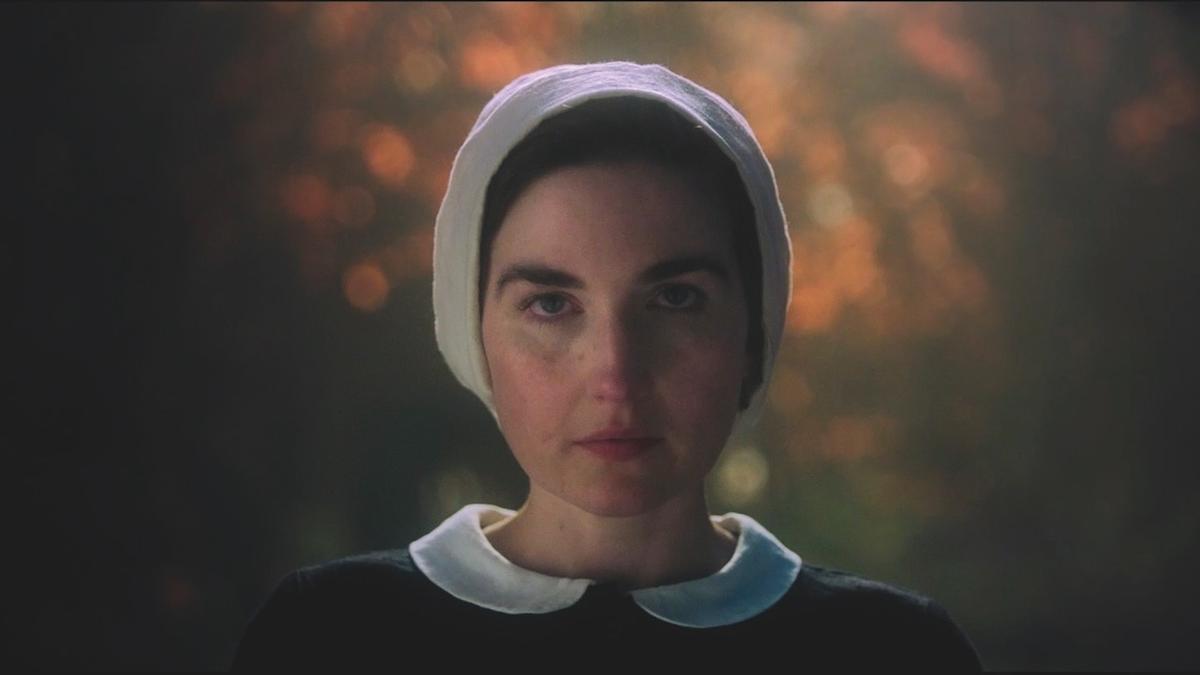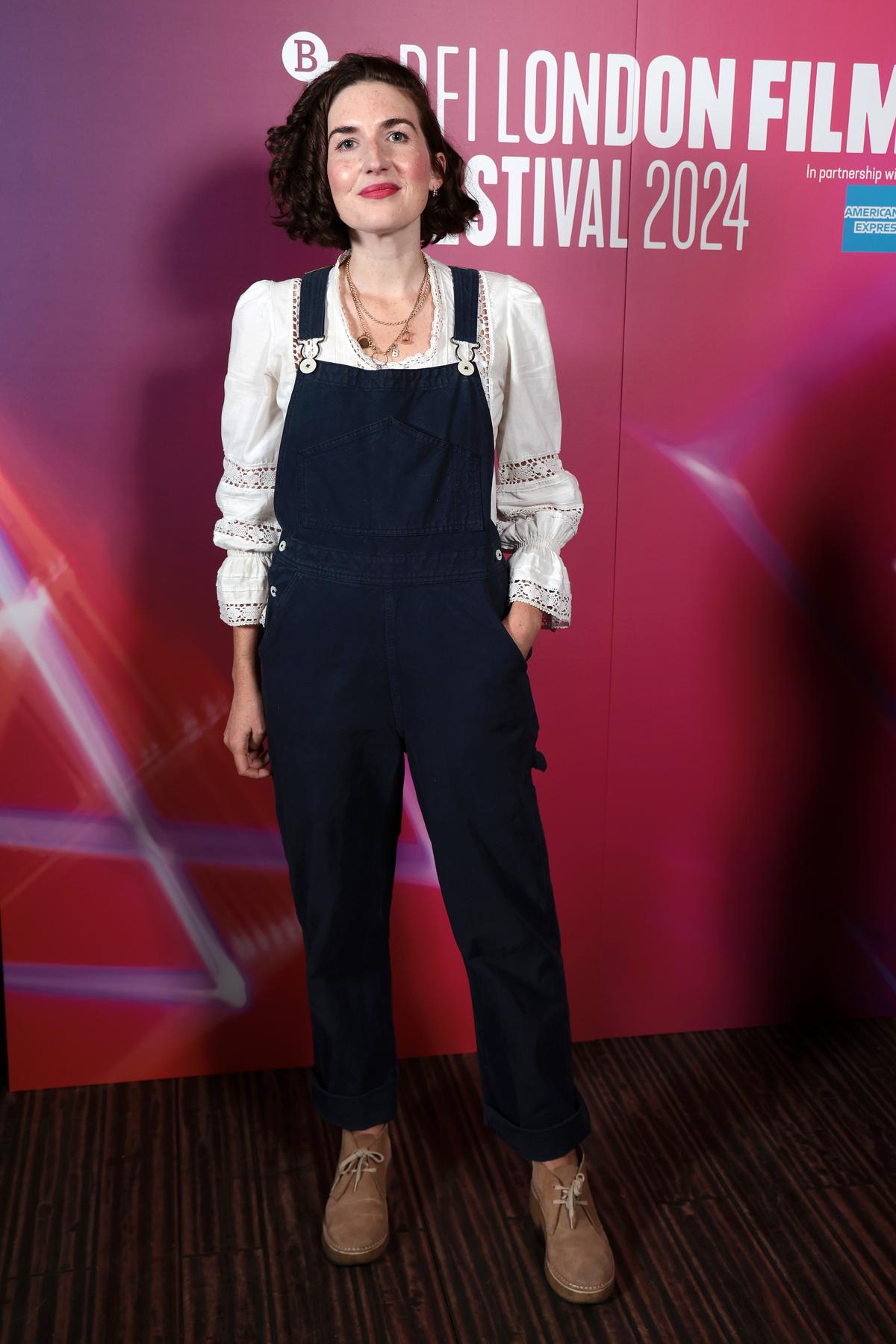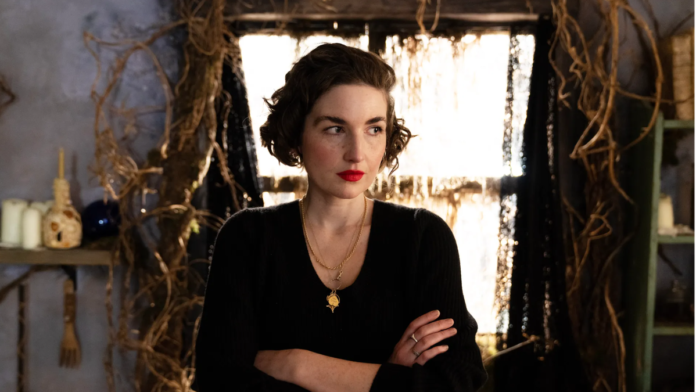As another lavish, big-budget musical adaptation of L. Frank Baum’s Oz is already dazzling audiences anew, Elizabeth Sankey’s spellbinding sophomore documentary swoops in with impeccable timing to hex a binary that has haunted women for centuries — one enshrined, ironically enough, by the technicolor shimmer of Judy Garland’s The Wizard of Oz. The naiveté of Glinda’s syrupy inquiry — “Are you a good witch or a bad witch?”—may have sounded unassuming in the film. However, it crystallised a trap that has ensnared women ever since: the impossible demand to choose a side, with damnation lurking no matter the answer.

The British filmmaker, who spent months in a psychiatric unit after experiencing severe postpartum anxiety and depression, uses Witches to untangle this age-old dichotomy, exploring how society’s deep fear of “monstrous” women has shaped everything from the witch trials of the past to modern maternal mental health stigmas.

Elizabeth Sankey in a still from ‘Witches’
| Photo Credit:
MUBI
As it turns out, part of the answer lay in The Wizard of Oz, a film Sankey revisited repeatedly during her recovery. She credits Matilda Jocelyn Gage, a 19th-century suffragist and the mother-in-law of Oz author L. Frank Baum, for inspiring Glinda’s character. “Gage was one of the first to say witches weren’t demonic or evil but marginalised women persecuted for stepping out of line,” Elizabeth says. “But Baum’s depiction inadvertently split them into ‘good’ and ‘bad’ — a deeply harmful idea because it ignores the nuance of human experience.”

That nuance is central to Witches, as it explores how society relegates women to a narrow spectrum of roles: saint or sinner, caregiver or calamity, good witch or bad. This binary, Elizabeth argues, mirrors the impossible expectations placed on women, particularly mothers.
The stakes, as she learned firsthand during her postpartum struggles, are alarmingly high. “When I was ill,” she shares, “I felt split into good and bad versions of myself. And so that idea of two versions of me fighting for control really resonated with me — this idea that I had been pushed into that feeling by society and the culture I had consumed.
Though Witches is a melange of genres, Elizabeth seems to agree that horror feels uniquely suited to feminist storytelling. “I was always terrified of horror films before I became ill,” she admits. “As soon as I went through my illness, I wasn’t scared of them anymore. Because I’ve lived through one.”
“Men are scared that women will laugh at them while women are scared that men will kill them,” she says matter-of-factly. It’s precisely why horror, with its rogue gallery of terrifying women, seemed like an odd balm during her recovery. “I found the women in those films aspirational — not in the terrible things they were doing, but in their acceptance of their darkness, madness, and rage.” For Elizabeth, these characters seemed to serve less as cautionary tales and more as blueprints for autonomy and defiance in the face of prescriptive, puritanical codes of Hollywood.

Yet Elizabeth is careful not to romanticise the darkness. Witches walks a fine line, honouring the complexities of postpartum mental health without sensationalising the pain.
One of the film’s most urgent themes is what philosopher Miranda Fricker calls “testimonial injustice” — the tendency to dismiss certain voices, particularly women’s, as unreliable or unworthy of belief. “I just wanted to give those women a chance to speak and tell their own stories,” Elizabeth says. Her own experiences were fraught with a maddening invisibility — both self-imposed and systemic. “It’s not like I had a bad cut on my arm and could walk into a doctor’s office saying, ‘Fix it.’ I didn’t even know what was happening to me.”

Elizabeth Sankey attends the 68th BFI London Film Festival launch at BFI Southbank on September 04, 2024 in London
| Photo Credit:
Shane Anthony Sinclair
She invites a lively selection of survivors, healthcare professionals, and historians to speak without judgment and interruption. The project here becomes a coven of shared experiences, both convergent and wildly divergent. “It was devastating but also so important to see those differences,” Elizabeth admits. At its heart, the film isn’t about providing answers. It is about creating space for questions no one has dared to ask.
Since the U.S. elections, Elizabeth has felt a noticeable shift in how Witches has been received. “There’s been this charged energy in the comments,” she says, referencing a clip shared by MUBI that sparked fervent discussion. “Men and women alike seem scared, angry, and searching for new ways to articulate what feels so unjust.” With its exploration of bodily autonomy and societal control, the film now resonates differently — its themes uncomfortably aligned with the anxieties of the current political climate.

But despite the weight of its subject matter, Witches isn’t without hope. Elizabeth’s son, it turns out, has a soft spot for witches — particularly the green-skinned menace of The Wizard of Oz. “He loves the Wicked Witch of the West,” her face lights up. “It’s great. I pretend to be a witch when we play, and he’s all in.”
There’s something poetic about this maternal passing of the broomstick, as though Elizabeth is not only reclaiming the witch for herself but ensuring her son grows up seeing witches as something more than villains. “I’m encouraging that witchy side in him,” she beams.
Witches is currently available to stream on MUBI
Published – November 22, 2024 10:27 am IST
